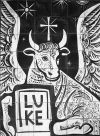
The Passion according to Luke
The Upper Room: Lk 22,14-38
"When the hour came" in verse 14 opens this meal scene. It ends in verse 38 because verse 39 tells of the move to the Mount of Olives. We have therefore a meal scene which is notably longer than that of Mark. In Mark, there is simply an announcement of the betrayer (Mk 14,17-21) followed by the Lord's supper (Mk 14,22-26).
In Luke, not only does the announcement of the betrayer come after the eating but the meal is set within a discourse, two meals as we will see in a moment. The sharing of food is the backdrop to a farewell speech by Jesus. I gave two examples of farewell speeches, that of King David (1 Kings 2,1-10) and from Luke himself that of Paul (Acts 20,17-38).
We therefore read 22,14-38 as a farewell speech in a meal setting. It could be called table talk.
Looking more closely at verses 15-18 and 19-20, it is notable that Luke unlike the other evangelists has the sharing of a cup before Jesus gives his body and blood as bread and wine. The setting of the first cup is that of a Passover meal (verse 15). Verses 19-20 then form the Lord's supper.
With that in mind, we can list the parts of the speech as follows:
- 14,15-18: Passover meal
- 14,19-20: Meal of the New Covenant
- 14,21-23: Betrayal predicted
- 14,24-27: Exhortation to service
- 14,28-30: Exhortation
- 14,31-34: Denial predicted
- 14,35-38: Exhortation
Overall, the account of the meal can be read as a unity with no major breaks.
After a short introduction (22,14-16) Luke goes straight into the account of the blessing of the bread and wine so that the whole speech comes afterwards, beginning with verse 21. This is in contrast to Mark where the blessing of the bread and wine is bracketed by the betrayals of Judas and Peter (Mk 14,17-31). Thus the Last Supper in Luke falls into two parts: 22,14-20 and 22,21-38. However, there is continuity between verses 20 and 21 so the blessing of the bread and the wine is an integral part of the whole.
Blessing over the Bread and the Wine 22,14-20
All accounts speak of Jesus "giving thanks" hence this central act of Christian worship is always known as Eucharist from the Greek word for thanks.
Luke's account of the Eucharist is closer to Paul's than to Mark's. There need be no surprise at the variations, it's a sign of different traditions around the early church. It's clear the Church has celebrated the Eucharist at all times and in all places but variations on the Lord's words are possible even today.
Beginning our verse by verse review with verse 14, we note that Luke refers to the hour whereas Mark simply refers to "evening". This is a theme which is much stronger in John's Gospel, as can be seen in Jn 2,4 (Cana) and Jn 13,1 (Last Supper).
The other detail in this verse is that Luke speaks of the apostles instead of the twelve. Perhaps this is in preparation for the Acts of the Apostles, highlighting the place of the leaders to come.
Verses 15 and 16 are special to Luke. His introduction to the meal draws out its deeper significance with its specific reference to the coming suffering of Jesus. "Fulfilled in the Kingdom of God" may refer to early Christian celebrations of the Eucharist with the presence of the risen Lord.
Luke has an introductory cup in verse 17, probably taken from the Jewish celebration of the Passover. We can note how Jesus says "divide it among yourselves". We can also note that Jesus here says "give thanks"
Verse 18 speaks of the coming kingdom of God.
As in verse 17, Jesus again gives thanks over the bread in verse 19. This is special to Luke; the other Gospels use "blessed" for the bread (Mk 14,22).
Verse 20 stresses that the covenant is a new covenant (Jer 31,31) and that it will be poured out.
We see Luke stressing that the Last Supper is a Passover meal which anticipates what is about to come and will therefore like the Passover always be celebrated as a living memory of Jesus. Thus there is a new Passover and a new covenant. Luke also makes a strong link with the sacrifice to come. There is a stress on suffering in verse 15 and the blood is poured out in verse 20. These are the themes which are taken further in the following verses.
Return to the main page
The Discourse: Lk 22,21-38
There is continuity between verses 20 and 21 but it helps to read the speech separately.
The various references show how Luke has put together the speech from a variety of sayings. Luke has already had the disciples arguing who is the greatest (9,46). There as in Mark, Jesus used a little child as an example. The setting in both Gospels is Jesus predicting his passion, as is Mark 10,42-44. Luke is therefore bringing these earlier questions into the immediate setting of his passion.
The threads running through this discourse are those of betrayal and faithfulness. Jesus of course is completly faithful and he calls on his followers to be the same (19,27-30). This is directed in a special way towards Simon Peter (22,32). However, Peter becomes one of the betrayers (22,34), picking up the other thread, set in 19,21. The squabbling disciples (22,24) also rate as betrayers. Yet reconciliation is possible if they get their priorities right (22,25-26).
This Gospel is about mission and the call to fidelity and trust in mission is found in the last part of this farewell speech (22,35-38). Even then the disciples don't get the message: all they can do is to produce two swords (22,38)
Now return to the main page
